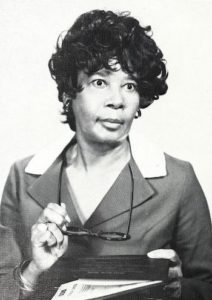
Mary Fair Burks
*Mary Fair Burks was born on this date in 1914. She was a Black educator, scholar, and activist.
She was the daughter of Gustavus "Gus" Samuel and Ollie (née Williams) Fair. She attended Alabama State University and earned a Bachelor of Science degree in English literature in 1933, and Michigan State University, where she earned a Master of Arts degree in the same field in 1934. Burks then returned to Montgomery to teach English at Alabama State Laboratory High School. The school’s principal, Nathaniel W. Burks, was a former professor of hers, and the two eventually married and had a child together. Their son, also named Nathaniel W. Burks, became a physician.
She was head of the English department at Alabama State University in the late 1940s and early 1950s. Burks continued her schooling by earning her doctorate in education from Columbia University and completing further postgraduate studies at universities such as Harvard and Oxford.
In 1935, Burks was involved in an incident with a white motorist that led to her being arrested by a white police officer. The incident demonstrated the prevalence of racism in Montgomery to Burks, which she had felt previously shielded from due to her education level and status. The incident inspired Burks to focus on advocating for racial equality in Montgomery, and a year later, she founded the Women’s Political Council. The WPC focused on promoting civic involvement, increasing fighting against voter suppression, and lobbying city officials to address racist policies. At its formation in 1946, the organization comprised 50 Black community members with occupations ranging from educators to nurses to social workers.
Burks later wrote that she created the council as an “outgrowth of scars she suffered as a result of racism.” In 1950, Burks stepped down from her position as president of the WPC; she maintained an active role in the organization, which turned its focus towards the racial inequality Blacks experienced on public transportation, particularly buses. From 1955-1956, she and the other members of the WPC helped initiate and provide support for the Montgomery Bus Boycott after the arrest of Rosa Parks.
Following the end of that chapter of the American Civil Rights Movement, Burks emphasized the importance of the organization in starting the Montgomery Bus Boycott and, therefore, the entire movement. Burks expressed that “Rosa Parks, Jo Ann Robinson, and members of the Women’s Political Council were trailblazers,” and “Martin Luther King, Jr. was a torchbearer,” claiming that a torchbearer is “one who follows the trailblazer.” In 1960, Burks resigned from Alabama State College after several professors were fired for their involvement in civil rights issues. Among the other 16 faculty members fired from the college was Robinson, a fellow member of the Women's Political Council that Burks worked closely with.
Burks moved to Salisbury, Maryland. Burks was an active member of her community there, where she founded two African American historical societies, worked with the volunteer program of a local hospital, and became a member of the Maryland Arts Council. Burks published numerous literary works, including a review of James Baldwin’s If Beale Street Could Talk and articles on Toni Morrison and other Black authors. In 1976, her journal article “The First Black Literary Magazine in American Letters” was published. In 1991, Burks contributed to a book titled “Women in the Civil Rights Movement: Trailblazers and Torchbearers.” The book included segments composed by various authors, and Burks wrote the “Montgomery Bus Boycott” section.
She was appointed to a National Endowment for the Humanities reviewing panel in 1979. She also taught literature at the University of Maryland Eastern Shore until her retirement in 1986. Mary Fair Burks died on July 21, 1991.